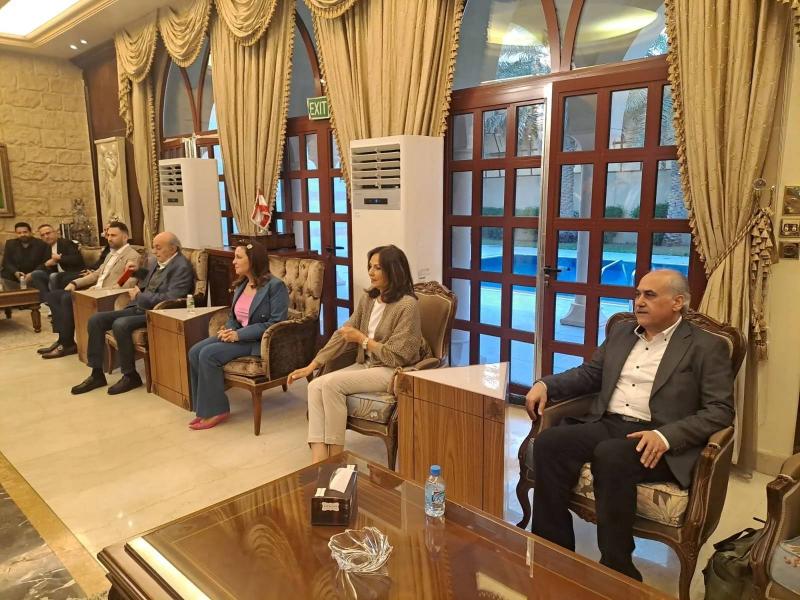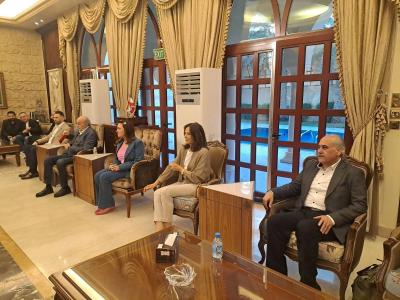The Druze leader Walid Jumblatt, accompanied by the head of the Progressive Socialist Party, MP Taymour Jumblatt, met with the Lebanese community in Qatar at the Lebanese Embassy in Doha. The meeting was attended by the Lebanese Ambassador to Qatar, Farah Berri, Nora Jumblatt, and Secretary of the Democratic Gathering bloc, MP Hadi Abou Hassan.
During his speech, Jumblatt recalled the Doha Agreement of May 2008 and emphasized the importance of the Taif Agreement, stating, "It is very important to adhere to the Taif Agreement and the Doha Agreement. When conditions improve, we will see if there is a possibility to improve some aspects of the Taif Agreement or to implement what remains of it, particularly regarding administrative decentralization." He affirmed his support for decentralization but stated he is not in favor of federalism or division.
He addressed the members of the community, saying: "Enjoy the benefits of this country, maintain national unity, and abide by the law, as this is the most important thing you can do here. Leave politics and social media aside, and let some politicians in Lebanon resolve their differences. I have abandoned politics, but after October 7, I returned to engage in the Palestinian cause," pointing out the racial and political disputes in Lebanon and urging them not to be affected by them, stressing the importance of Lebanese unity in Qatar.
Jumblatt continued: "The ambassador asked me 'Where to?' This is a difficult question to answer accurately today, but let us all continue the tremendous efforts made by President Nabih Berri regarding the separation of paths between Lebanon and Gaza to avoid further destruction, devastation, displacement, and assassinations in southern Lebanon. Some in Lebanon seem to have forgotten that there is a southern part to Lebanon, and where will the Israeli leadership go? To more wars. The war is only at its beginning and will continue until the end of the year and perhaps beyond, even after the American elections," noting that "presidents in America and elsewhere do not care about Palestine or southern Lebanon; they are focused on narrow American electoral calculations. Therefore, we must increase solidarity and unity, and we hope that President Berri's efforts and the American envoy Amos Hochstein's efforts will succeed within the possible circumstances."
He added, "As I understood from President Berri, there are still 13 contentious points regarding the borders between us and Israel, and what is required is to stop the aggressions. We have previously proposed returning to the ceasefire agreement that existed between the Israeli occupation of Palestine and Lebanon, meaning there should be a precise balance between the armed forces on the Lebanese side in the north and the Israeli side. The response was a refusal, and thus Israel invades not just the south but also Baalbek, western Bekaa, and Beirut with its drones. This is the entrance to the ceasefire agreement to reach the minimum level of stability after delineation."
Regarding the Shebaa Farms, Jumblatt said, "If you ask me about the issue of Shebaa Farms, I wish for them to be Lebanese, but they cannot be Lebanese until the borders between us and the Syrians are delineated. This was agreed upon unanimously in 2006 when President Berri called us to dialogue in the Star Square, but the delineation must take place between the Lebanese state and the Syrian state, and it has not been done. After that, we go to delineate in the United Nations to determine whether the Shebaa Farms and Kfarshouba Hills are Lebanese or not."
On the issue of Syrian refugees, Jumblatt stated, "The Progressive Socialist Party has presented a clear memorandum to classify the presence of Syrians. There are refugees for economic reasons, some for humanitarian reasons, and there are long-term residents and workers who the Lebanese economy cannot do without. There are also bourgeois refugees. Therefore, we must be precise before engaging in random, hate-filled campaigns that could cause a long-term vertical division in Lebanon, which we are better off without. The parliamentary council has issued a recommendation, and we certainly have room for precise cooperation between the Lebanese government and supporting institutions, but it seems that some are hesitant to cooperate."
Jumblatt praised Qatar's role, saying: "Qatar has been and will continue to be supportive of Lebanon, especially for the security forces and the Lebanese army, which is very important for the unity of Lebanon and Lebanese security. Some of us in Lebanon, amid these developments, are undermining institutions, which is not beneficial. There are effective institutions in Lebanese intelligence, public security, and information, and we must support and enhance them for the safety of citizens before conditions improve."
Regarding the presidential elections, Jumblatt stated: "There must be a consensus among political forces, with the assistance of the quintet committee, to organize matters and elect a president, whoever it may be, through dialogue and settlement."




